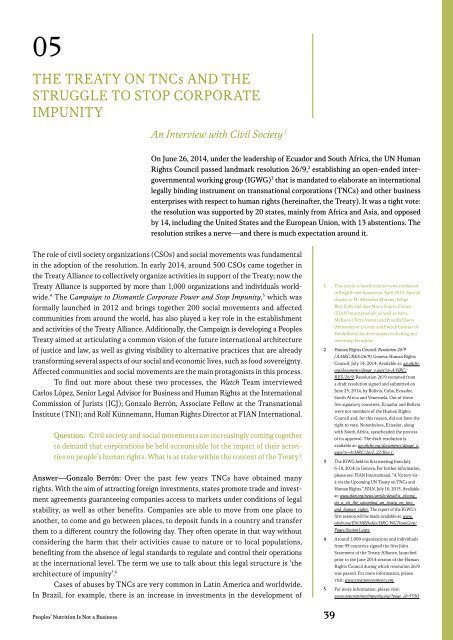RIGHT TO FOOD AND NUTRITION WATCH
1iNBHTY
1iNBHTY
You also want an ePaper? Increase the reach of your titles
YUMPU automatically turns print PDFs into web optimized ePapers that Google loves.
05<br />
THE TREATY ON TNCs <strong>AND</strong> THE<br />
STRUGGLE <strong>TO</strong> S<strong>TO</strong>P CORPORATE<br />
IMPUNITY<br />
An Interview with Civil Society 1<br />
On June 26, 2014, under the leadership of Ecuador and South Africa, the UN Human<br />
Rights Council passed landmark resolution 26/9, 2 establishing an open-ended intergovernmental<br />
working group (IGWG) 3 that is mandated to elaborate an international<br />
legally binding instrument on transnational corporations (TNCs) and other business<br />
enterprises with respect to human rights (hereinafter, the Treaty). It was a tight vote:<br />
the resolution was supported by 20 states, mainly from Africa and Asia, and opposed<br />
by 14, including the United States and the European Union, with 13 abstentions. The<br />
resolution strikes a nerve—and there is much expectation around it.<br />
The role of civil society organizations (CSOs) and social movements was fundamental<br />
in the adoption of the resolution. In early 2014, around 500 CSOs came together in<br />
the Treaty Alliance to collectively organize activities in support of the Treaty; now the<br />
Treaty Alliance is supported by more than 1,000 organizations and individuals worldwide.<br />
4 The Campaign to Dismantle Corporate Power and Stop Impunity, 5 which was<br />
formally launched in 2012 and brings together 200 social movements and affected<br />
communities from around the world, has also played a key role in the establishment<br />
and activities of the Treaty Alliance. Additionally, the Campaign is developing a Peoples<br />
Treaty aimed at articulating a common vision of the future international architecture<br />
of justice and law, as well as giving visibility to alternative practices that are already<br />
transforming several aspects of our social and economic lives, such as food sovereignty.<br />
Affected communities and social movements are the main protagonists in this process.<br />
To find out more about these two processes, the Watch Team interviewed<br />
Carlos López, Senior Legal Advisor for Business and Human Rights at the International<br />
Commission of Jurists (ICJ); Gonzalo Berrón, Associate Fellow at the Transnational<br />
Institute (TNI); and Rolf Künnemann, Human Rights Director at FIAN International.<br />
Question:<br />
Civil society and social movements are increasingly coming together<br />
to demand that corporations be held accountable for the impact of their activities<br />
on people’s human rights. What is at stake within the context of the Treaty?<br />
AAnswerGonzalo Berrón: Over the past few years TNCs have obtained many<br />
rights. With the aim of attracting foreign investments, states promote trade and investment<br />
agreements guaranteeing companies access to markets under conditions of legal<br />
stability, as well as other benefits. Companies are able to move from one place to<br />
another, to come and go between places, to deposit funds in a country and transfer<br />
them to a different country the following day. They often operate in that way without<br />
considering the harm that their activities cause to nature or to local populations,<br />
benefiting from the absence of legal standards to regulate and control their operations<br />
at the international level. The term we use to talk about this legal structure is ‘the<br />
architecture of impunity’. 6<br />
Cases of abuses by TNCs are very common in Latin America and worldwide.<br />
In Brazil, for example, there is an increase in investments in the development of<br />
1 This article is based on interviews conducted<br />
in English and Spanish in April 2015. Special<br />
thanks to M. Alejandra Morena, Felipe<br />
Bley Folly and Ana María Suárez Franco<br />
(FIAN International), as well as Nora<br />
McKeon (Terra Nuova) and Priscilla Claeys<br />
(University of Louvain and French Institute of<br />
Pondicherry) for their support in drafting and<br />
reviewing this article.<br />
2 Human Rights Council. Resolution 26/9<br />
(A/HRC/RES/26/9). Geneva: Human Rights<br />
Council, July 14, 2014. Available at: ap.ohchr.<br />
org/documents/dpage_e.aspx?si=A/HRC/<br />
RES/26/9. Resolution 26/9 stemmed from<br />
a draft resolution signed and submitted on<br />
June 25, 2014, by Bolivia, Cuba, Ecuador,<br />
South Africa and Venezuela. Out of these<br />
five signatory countries, Ecuador and Bolivia<br />
were not members of the Human Rights<br />
Council and, for this reason, did not have the<br />
right to vote. Nonetheless, Ecuador, along<br />
with South Africa, spearheaded the process<br />
of its approval. The draft resolution is<br />
available at: ap.ohchr.org/documents/dpage_e.<br />
aspx?si=A/HRC/26/L.22/Rev.1.<br />
3 The IGWG held its first meeting from July<br />
6-10, 2014, in Geneva. For further information,<br />
please see: FIAN International. “A Victory visà-vis<br />
the Upcoming UN Treaty on TNCs and<br />
Human Rights.” FIAN, July 10, 2015. Available<br />
at: www.fian.org/news/article/detail/a_victory_<br />
vis_a_vis_the_upcoming_un_treaty_on_tncs_<br />
and_human_rights. The report of the IGWG’s<br />
first session will be made available at: www.<br />
ohchr.org/EN/HRBodies/HRC/WGTransCorp/<br />
Pages/Session1.aspx.<br />
4 Around 1,000 organizations and individuals<br />
from 95 countries signed the first Joint<br />
Statement of the Treaty Alliance, launched<br />
prior to the June 2014 session of the Human<br />
Rights Council during which resolution 26/9<br />
was passed. For more information, please<br />
visit: www.treatymovement.com.<br />
5 For more information, please visit:<br />
www.stopcorporateimpunity.org/?page_id=5530.<br />
Peoples’ Nutrition Is Not a Business 39


